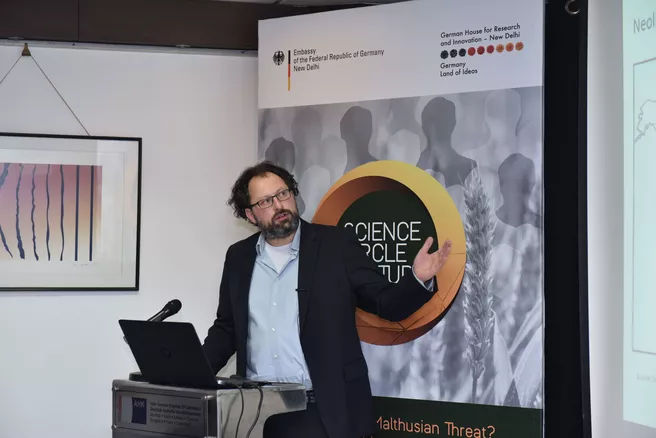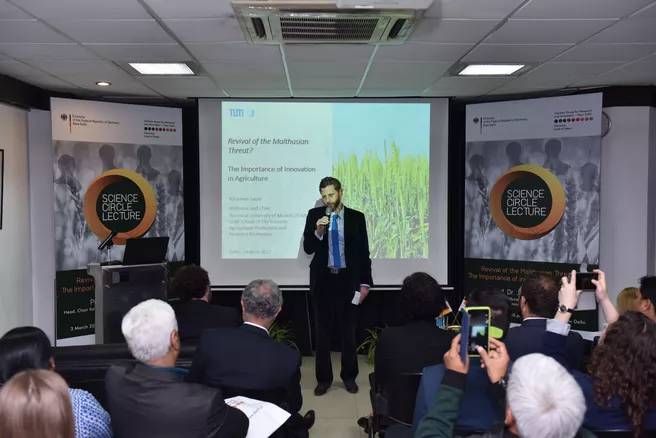On 03 March 2017, Prof. Sauer followed an invitation by the German Embassy to be a speaker at the “Science Circle Lecture”. This lecture series is regularly organized together with the German House for Research and Innovation (DWIH) in Delhi. It serves as a platform for German Scientists from all disciplines to showcase their research work and to engage in discussions with a wide audience in India.
Prof. Sauer’s lecture was the first “Science Circle Lecture” with TUM participation in India. During the one hour lecture, Prof. Sauer emphasized the relevance of innovative developments in the agricultural sector. Technological innovations and the diffusion of technology are the main reasons for the exponential agricultural growth worldwide, as well as productivity and income differences.
The topic of the lecture is of vital importance to India. This was also emphasized by the fully occupied conference room in the German House and the avid discussion of the nearly 70 participants. With a population of 1.25 billion people (2011 census) and an average population growth of 1.7% per annum, sufficient food supply is a key issue for India. Therefore, yield increase through advanced farming and processing methods is a declared objective of the Indian government. At the same time, the agricultural sector in India is facing challenges such as 1) diminishing agricultural land, 2) excessive consumption of resources, and 3) effects of climate change. Thomas Robert Malthus’ hypotheses from 1798, stating that linear agricultural growth cannot keep up with exponential population growth, is therefore of great relevance to India – the country with the second largest population in the world.
The agricultural sector is under constant pressure to modernize, invest and to develop sustainable innovations. One approach to counteract this tendency could be Climate-Smart-Agriculture (CSA), as Prof. Sauer pointed out in his lecture. This integrative approach is focusing on a sustainable increase of agricultural productivity, the adaptation and build-up of resilience of agricultural and food security systems, as well as the reduction of greenhouse gas emissions from agriculture. Prof. Sauer exemplified such a CSA-project of his Indian collaboration partner CCAFS (CGIAR Research Program on Climate Change, Agriculture and Food Security).
Malthus’ assumption was refuted by the innovation capacity of the agricultural sector. To furthermore increase agricultural productivity in the future and to secure the food supply for future generations, the diffusion of these innovations is paramount. This is precisely where the collaboration between CCAFS and the chair of Prof. Sauer comes into play.
The initiation of the collaboration between the Chair for Agricultural Production and Resource Economics and CCAFS in Delhi was supported by the TUM Global Incentive Fund.
Further information:
Chair of Agricultural Production and Resource Economics
German House for Research and Innovation (DWIH) New Delhi
German Embassy in New Delhi
TUM Global Incentive Fund

